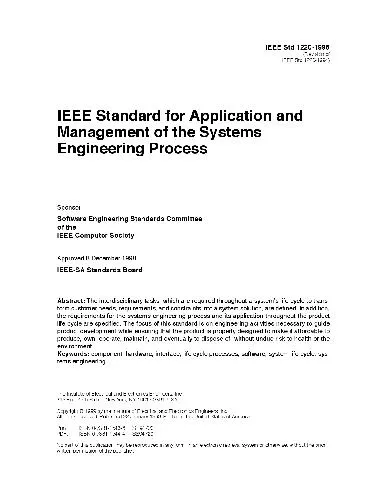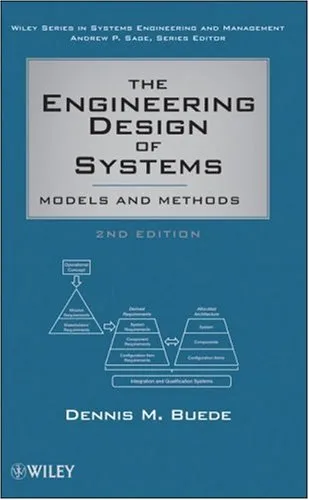Systems Engineering Principles and Practice (Wiley Series in Systems Engineering and Management)
4.5
بر اساس نظر کاربران

شما میتونید سوالاتتون در باره کتاب رو از هوش مصنوعیش بعد از ورود بپرسید
هر دانلود یا پرسش از هوش مصنوعی 2 امتیاز لازم دارد، برای بدست آوردن امتیاز رایگان، به صفحه ی راهنمای امتیازات سر بزنید و یک سری کار ارزشمند انجام بدینکتاب های مرتبط:
معرفی کتاب "Systems Engineering Principles and Practice"
کتاب "Systems Engineering Principles and Practice" که بخشی از سری کتابهای "Wiley Series in Systems Engineering and Management" است، به عنوان یک منبع کامل و جامع در زمینه مهندسی سیستمها شناخته میشود. این کتاب با هدف ارائه اصول و راهکارهای کاربردی در مهندسی سیستمها نوشته شده است و بهطور گسترده توسط مهندسین، محققین و دانشجویان مورد استفاده قرار میگیرد.
خلاصه کامل کتاب
در این کتاب، نویسندگان با استفاده از رویکردی واقعی و کاربردی به معرفی کامل اصول مهندسی سیستمها پرداختهاند. کتاب شامل مبحثهای متعدد و جامعی است که به بررسی عمیق جنبههای مختلف مهندسی سیستمها از جمله طراحی، توسعه، و پیادهسازی سیستمهای پیچیده میپردازد. مولفین در این کار با استفاده از نمونهها و موارد مطالعاتی دنیای واقعی، توانستهاند مطالب علمی و نظری را به زبانی قابل فهم و کاربردی ارائه دهند. در هر فصل، سعی بر این بوده است که خوانندگان بتوانند مهندسی سیستمها را بهعنوان یک پروسه جامع و منسجم درک کنند و توانایی استفاده از آن را در پروژههای واقعی کسب کنند.
نکات کلیدی کتاب
- شناخت دقیق از مراحل مختلف Systems Engineering و نقش هر کدام در موفقیت یک پروژه سیستماتیک.
- آشنایی با مدلهای مختلف Design و Development در Systems Engineering.
- مهارتهای تصمیمگیری و مدیریت ریسک در پروژههای سیستماتیک.
- بهکارگیری تئوریها و ابزارهای کیفی و کمی در فرایند Systems Engineering.
نقلقولهای معروف از کتاب
یکی از اصول بنیادی مهندسی سیستمها این است که سیستمهای ساده میتوانند سیستمهای پیچیدهتر را ایجاد کنند.
مهندسی سیستمها، ارتباط بین علوم و هنر برای تبدیل نیازها به راهحلهای عملی است.
چرا این کتاب مهم است
کتاب "Systems Engineering Principles and Practice" بهعنوان یک منبع اصلی برای همه کسانی که در زمینههای مربوط به توسعه و طراحی سیستمها فعالیت میکنند اهمیت دارد. از آنجایی که در دنیای امروز سیستمها بیش از پیش پیچیدهتر شدهاند، داشتن یک رویکرد سیستماتیک و روشمند برای مدیریت این پیچیدگیها حیاتی است. این کتاب با ارائه راهکارها و تکنیکهای کاربردی نقش مهمی در پیشبرد پروژههای پیچیده ایفا میکند و به مهندسین این امکان را میدهد تا با بهکارگیری بهترین شیوهها در مهندسی سیستمها، برنامهها و پروژههای خود را با موفقیت انجام دهند. اهمیت این کتاب نه تنها در ارائه اطلاعات پایه بلکه در تمرکز بر کاربرد عملی آنها در وضعیتهای واقعی نهفته است.
Introduction to 'Systems Engineering Principles and Practice'
Welcome to a comprehensive guide to understanding and applying systems engineering in modern projects. With 'Systems Engineering Principles and Practice', you are about to explore the methodologies, processes, and essential principles necessary to design complex, high-performing systems effectively and efficiently.
Detailed Summary of the Book
The book covers a wide array of concepts integral to systems engineering. It begins with an introduction to the discipline, defining systems engineering and its importance in orchestrating complex systems. It adeptly traverses through the lifecycle of systems engineering, from the initial conceptualization and analysis phase to design, implementation, testing, operational support, and eventually, retirement.
Readers will find practical insights into systems thinking, the intersection of technical and management processes, and how to maintain a user-centric approach amidst the technological intricacies. The authors emphasize the necessity of understanding customer needs and system requirements, followed by an astute discussion on systems architecture and modeling techniques.
The book also addresses the often-overlooked areas of risk management, performance measurement, and systems engineering management. Each chapter is imbued with real-world examples, case studies, and illustrative diagrams to aid learning and comprehension, ensuring that complex theories are accessible and applicable to a variety of sectors.
Key Takeaways
- The quintessential role of systems engineering in managing complex projects from conception to disposal.
- Vital strategies for integrating and aligning technical and managerial teams.
- Approaches to risk assessment, lifecycle cost management, and sustaining system value over time.
- The importance of stakeholder engagement, requirements engineering, and maintaining focus on delivering customer value.
- Insights into evolving trends in systems engineering and the impact of emerging technologies and practices.
Famous Quotes from the Book
"Systems engineering is the art and science of creating whole solutions that meet the needs of users and stakeholders within the constraints of the project's environment."
"A true systems engineer embraces the complexity of integrating varied components into a cohesive and high-functioning solution, transforming potential chaos into structured simplicity."
Why This Book Matters
In today's intricate technological landscape, where every industry faces challenges akin to managing multifaceted systems, 'Systems Engineering Principles and Practice' serves as an essential educational resource. It addresses the urgent need for a structured approach to managing complexity, ensuring that technologies and processes align with overarching business and operational objectives.
By equipping systems engineers, students, and practitioners with the tools and insights needed to foster innovation while safeguarding reliability and performance, the book cultivates a new generation of thinkers who can adeptly navigate and excel in diverse fields such as aerospace, automotive, IT, healthcare, and beyond.
Throughout its pages, this book underscores the prominent role systems engineering plays in reducing risks, enhancing customer satisfaction, and ultimately driving successful project outcomes in a world increasingly dependent on sophisticated, interconnected systems.
دانلود رایگان مستقیم
شما میتونید سوالاتتون در باره کتاب رو از هوش مصنوعیش بعد از ورود بپرسید
دسترسی به کتابها از طریق پلتفرمهای قانونی و کتابخانههای عمومی نه تنها از حقوق نویسندگان و ناشران حمایت میکند، بلکه به پایداری فرهنگ کتابخوانی نیز کمک میرساند. پیش از دانلود، لحظهای به بررسی این گزینهها فکر کنید.
این کتاب رو در پلتفرم های دیگه ببینید
WorldCat به شما کمک میکنه تا کتاب ها رو در کتابخانه های سراسر دنیا پیدا کنید
امتیازها، نظرات تخصصی و صحبت ها درباره کتاب را در Goodreads ببینید
کتابهای کمیاب یا دست دوم را در AbeBooks پیدا کنید و بخرید
1502
بازدید4.5
امتیاز0
نظر98%
رضایتنظرات:
4.5
بر اساس 0 نظر کاربران
Questions & Answers
Ask questions about this book or help others by answering
No questions yet. Be the first to ask!















